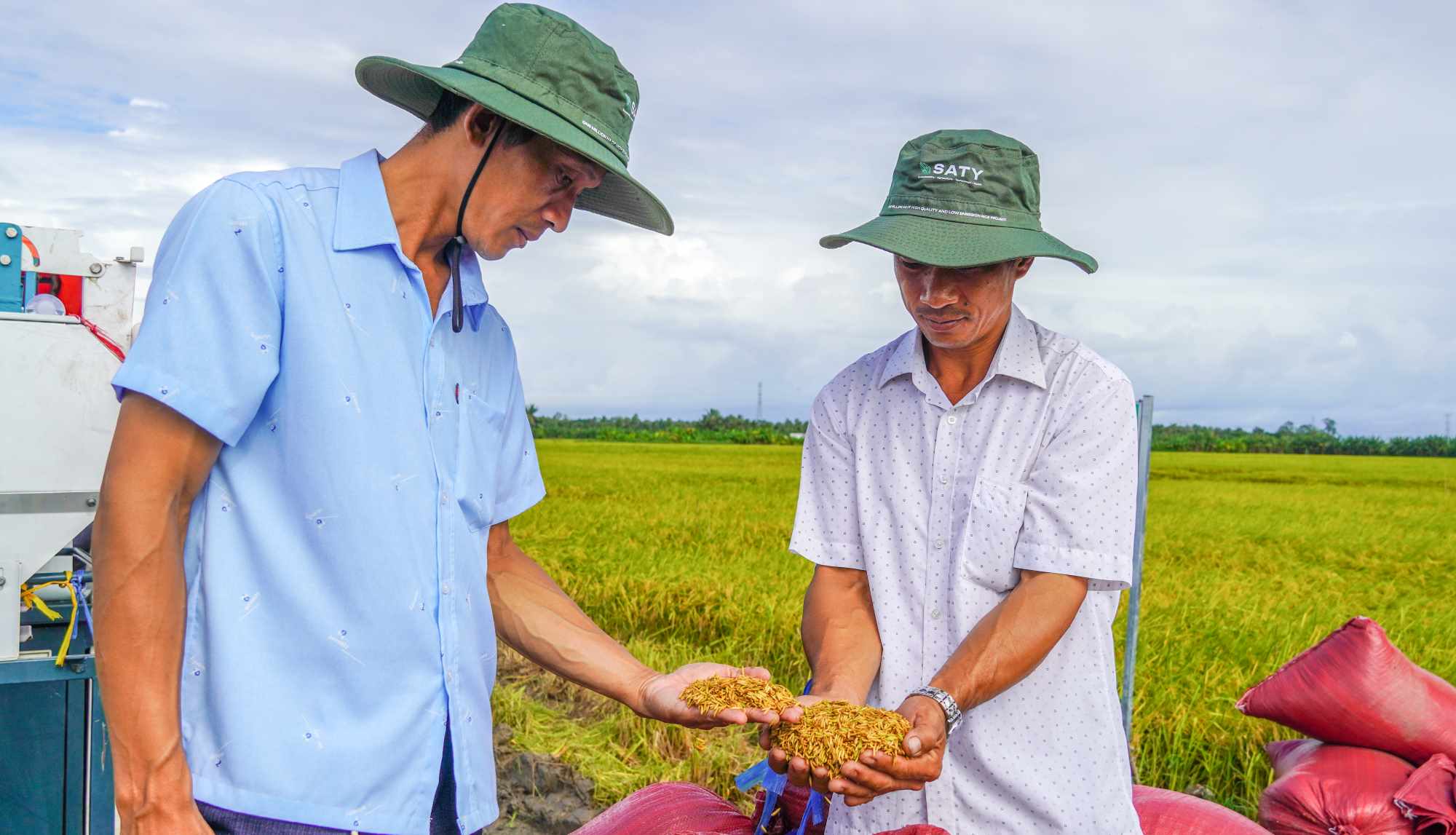Increase income 20-25%
These days, the winter-spring rice fields in the Mekong Delta are covered in a brilliant yellow. We arrived at the ST25 rice field in Long Duc commune (Long Phu district, Soc Trang province) when the harvest was only a few days away. Mr. Truong Van Hung - Director of Hung Loi Agricultural Cooperative - said that this is the second crop of 50 hectares of rice of the cooperative cultivated according to the Sustainable Development Project of 1 million hectares of high-quality, low-emission rice cultivation associated with green growth in the Mekong Delta region by 2030.
Mr. Hung informed that when participating in the model, farmers are supported 100% of the cost of sowing and 50% of the seeds and agricultural materials. Sowing by machine combined with burying fertilizer has helped reduce 10kg of seeds/ha, reduce 4 times of spraying pesticides and reduce over 41% of nitrogen compared to outside the model. "Despite reducing the amount of seeds, fertilizers and pesticides, high productivity is still achieved. Typically, the last Summer-Autumn crop reached 7 tons/ha. The rice was purchased by the enterprise at a price of 10,800 VND/kg, 2,300 VND/kg higher than the same period last year. After deducting costs, the profit was 5.2 million VND higher than outside the model" - Mr. Hung informed.
Deputy Minister of Agriculture and Rural Development Tran Thanh Nam informed that in 2024, the ministry, together with localities and the International Rice Research Institute, organized the implementation of 7 pilot models in 5 provinces and cities (Can Tho, Dong Thap, Kien Giang, Tra Vinh, Soc Trang). In fact, the models all gave positive signals. Fields implementing the model reduced costs by 20-30%, reduced 2-3 times of spraying pesticides and reduced about 30-40% of irrigation water. Rice yield reached 6.3-6.6 tons/ha, an increase of 10%; increased farmers' income by 20-25% compared to control fields; reduced an average of 5-6 tons of CO2/ha. All rice was purchased by enterprises at a higher purchase price of 200-300 VND/kg.
"The Ministry has agreed with localities to continue to replicate this model in all 12 provinces and apply it immediately in the Fall-Winter 2024 and Winter-Spring 2024-2025 crops," said Deputy Minister Tran Thanh Nam.

Still challenging
According to Deputy Minister Tran Thanh Nam, Vietnam is the first country to implement the Emission Reduction Rice Production Program on a large scale. The activities and contents are all new and unprecedented in terms of policy mechanisms, implementation methods, organization methods and resource mobilization.
Regarding capital, Deputy Minister Nam said that in the period of 2026-2030, it is necessary to prepare investment capital for infrastructure for proactive irrigation and synchronous mechanization to serve rice production; have open mechanisms and policies to accelerate the preparation and implementation of public investment projects within the scope of State investment for the project. It is necessary to quickly deploy credit packages for cooperatives and enterprises participating in the project to borrow to buy materials, purchase rice for farmers, machinery and equipment for preservation, processing, and invest in warehouse and logistics systems.
Revolution for rice
At the conference to discuss solutions to promote the implementation of the Project in October 2024, Prime Minister Pham Minh Chinh stated that the project is extremely meaningful to farmers in the Mekong Delta, to the rice industry and to the task of responding to climate change, aiming to bring net emissions to zero in accordance with Vietnam's commitment at the COP26 Conference.
The Prime Minister said that in today's era, with the trend of "eating well, eating cleanly", competition is very high, it is necessary to "breathe new life" into the agricultural sector, the rice sector in the Mekong Delta, the largest agricultural production area of the country. "We must love rice as we love ourselves, as what we love most in our lives, thereby creating a revolution for rice and the Mekong Delta" - said the Prime Minister.
To effectively implement the project, Prime Minister Pham Minh Chinh requested to promote the combined strength of the political system, first of all, the self-reliance of localities; accelerate, make a breakthrough, achieve the target of 1 million hectares of high-quality, low-emission rice to achieve 14-15 million tons of rice, 9-10 million tons of rice from this Project before 2030 as soon as possible.
The Prime Minister stated that planning must be stable and long-term to develop rice. With the principle of high quality and low emissions, applying science and technology to build a high-quality rice brand for the high-quality consumer segment, this is worthy of the Mekong Delta region.
Vietnam's total rice export volume and value in the first 11 months of 2024 reached nearly 8.5 million tons with a value of 5.31 billion USD, up 10.6% in volume and 22.4% in value over the same period. The average export price of rice in the first 11 months of 2024 is estimated at 627.9 USD/ton, up 10.6% over the same period in 2023, the highest ever.
(Posted on the special edition of Lao Dong Xuan At Ty)











